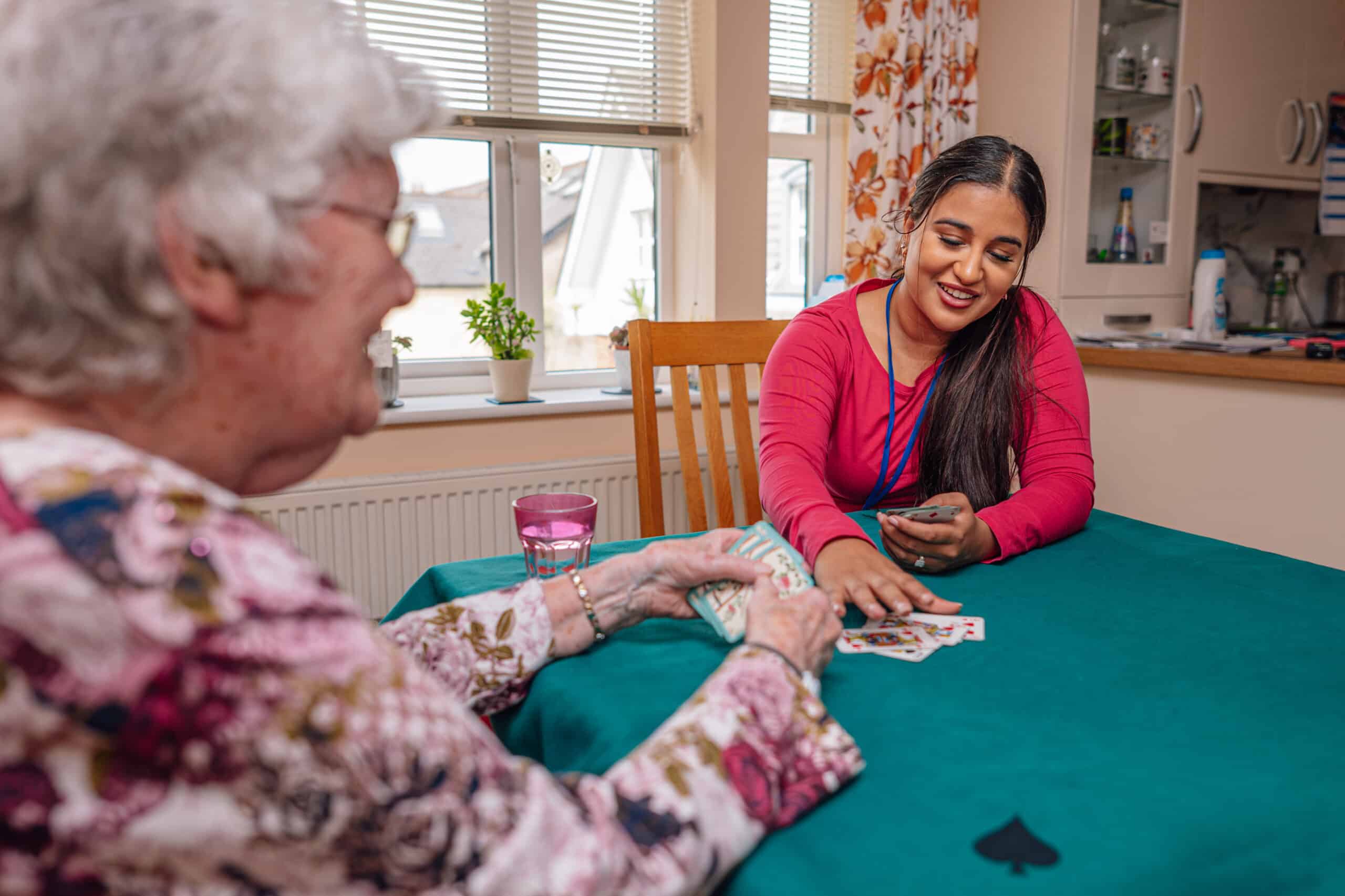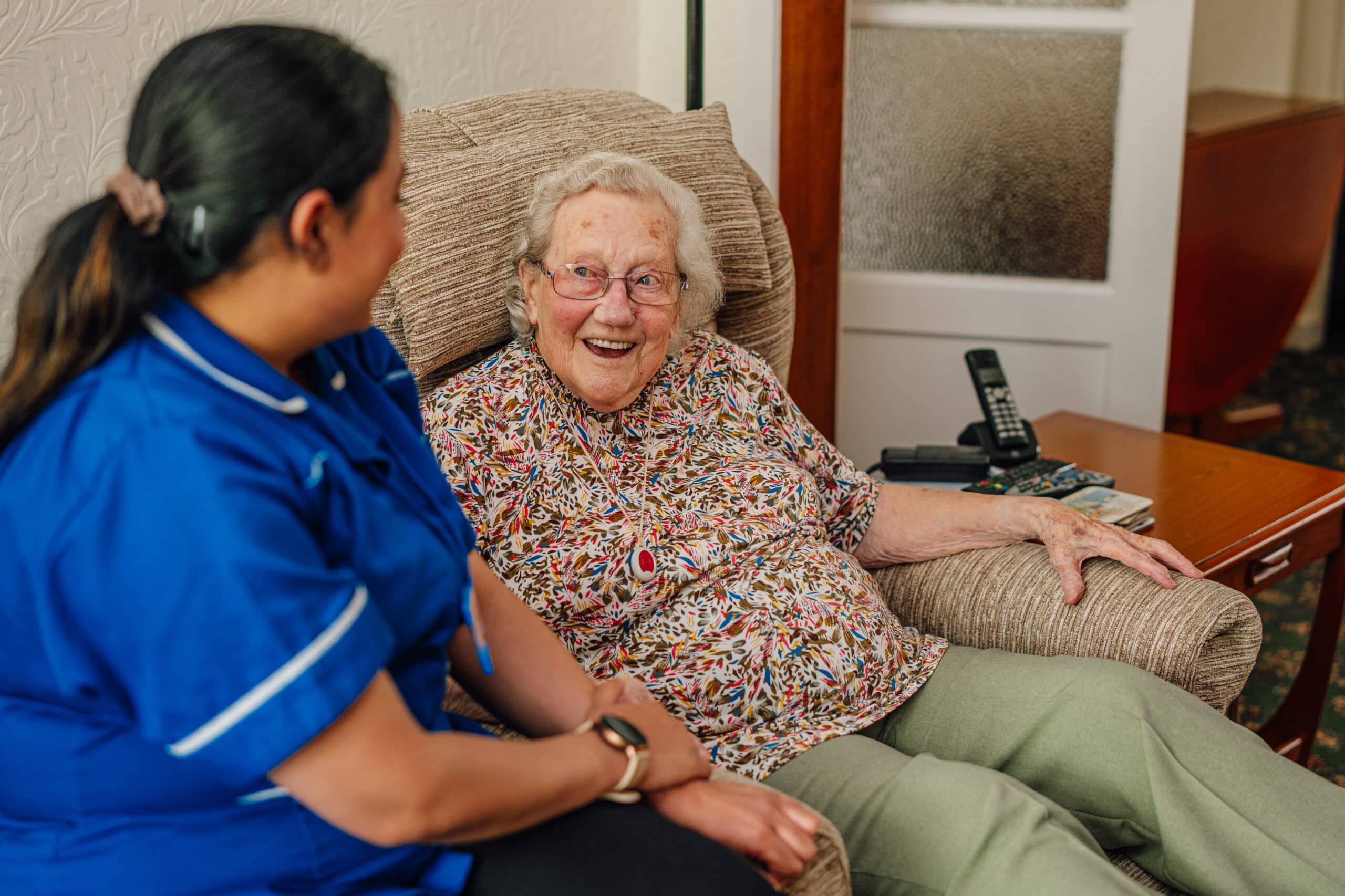Domiciliary Care
Flexible Domiciliary Care At Home
Domiciliary care involves regular visits from a trained care assistant to your home. Your carer can help with washing, dressing, meals and simple housework. They also offer a kind face and time to listen. This support helps you stay safe, independent and calm in the place you know best.
Everyday Support That Fits Around You
Our service helps with the small things that make each day run smoothly. A care assistant can help with meals, washing, dressing and light housework. They also bring a warm smile and time to talk. Support fits your routine so you can stay in control and feel safe at home.



What is Domiciliary Care?
Domiciliary care is care at home from trained care assistants. They visit at agreed-upon times to help with daily tasks. This might include washing, dressing, meals, medicine prompts and simple housework. Your care plan is built with you, so support feels calm, kind and respectful.
Domiciliary care suits people who want to stay where they feel safe but need extra help each day. Visits can be short or longer, once in a while or several times a day. Support can grow or reduce if your needs change. With gentle help in your own home, you can stay independent while your family has peace of mind.


Domiciliary Care with Caremark
Our domiciliary care with Caremark gives you regular visits from kind, trained care assistants. Each visit is planned around your routine, so support feels calm, simple, and respectful. Your care assistant can help with
- Personal care such as washing, dressing, and toileting
- Help to take tablets and follow simple health tasks
- Preparing meals and drinks you enjoy
- Light housework like tidying, laundry, and cleaning key areas
- Help for people living with dementia or memory loss
- Extra support for conditions such as Parkinson’s
- A smooth move to longer visits, overnight care or live-in care if your needs change
Practical Help With Everyday Life
The right support at home can make each day feel calmer and less stressful. Care fits around your routine so you can carry on with your own life while feeling safe and supported. Some key benefits include:
- Staying in your own home close to people and places you know
- Keeping control of your daily routine and choices
- Getting help with washing, dressing, meals and tablets when you need it
- Feeling safer moving around your home with less risk of falls
- Having regular checks that can spot small changes in your health
- Giving family members a break so they can relax and worry less



Who Can Be Supported?
This type of support is for people who want to stay at home but need extra help to feel safe and well. It can suit older people, adults with a long-term illness or disability, or anyone who finds daily tasks harder than before. It can also help after a hospital stay or when your health or routine starts to change.
Families also benefit from this support. Regular visits from a kind care assistant bring comfort and peace of mind. Support is planned with you so it fits your health needs, your routine and the small things that matter each day. With this steady help, many people can stay at home for longer and feel more relaxed and secure.
Why Choose Domiciliary Care?
This helps you stay in a place that feels like home while still getting the support you need each day. You decide when visits happen and what tasks matter most, so your routine stays your own. A kind care assistant can help with washing, meals, tablets and moving about safely, while also taking time to talk and listen. Family members often feel calmer too, knowing someone they trust is checking in and spotting small changes early. It is a gentle way to stay independent, with steady care in reach when life starts to feel a little harder.

FAQs – Domiciliary Care
Visit times are very flexible. Some people choose a few short visits each week. Others have support several times a day. Your local Caremark team will plan visit times around your routine and review them if your needs change.
The cost depends on the level of help you need, how long each visit lasts, and where you live. We do not have one fixed price, as every plan is different. Your local Caremark office will offer a free, no-pressure chat and give you a clear quote before care starts.
Some people pay for domiciliary care themselves. Others receive help from their local council or, in some cases, the NHS for specific health needs. It is a good idea to ask for a care needs assessment and a financial assessment from your local authority. Your Caremark team can guide you through this and explain common funding options.
We know it is important to see familiar faces. Wherever possible, support is provided by a small, regular team who get to know you well. Sometimes we use another trusted care assistant for holidays or sickness, but we always try to keep changes to a minimum and tell you in advance.
Yes. Many Caremark offices support people who live with dementia, Parkinson’s and other long-term conditions. Care assistants receive training to provide safe, calm support and to follow advice from health professionals. Your plan will reflect your diagnosis, your routines and the way you like things done.
In a care home, you move out of your house to live in a shared setting where staff are on site all day and night. Daily routines like meals and activities are usually set for the whole home. With domiciliary care, you stay in your own home and a care assistant visits at agreed times. You keep control of your surroundings and routine while still getting the support you need.
With domiciliary care, a care assistant visits at agreed times during the day or evening and then goes home. With live-in care, a care assistant moves into your home to give steady support throughout the day and be close by at night. Some people start with visits and later move to live-in care if they need more help.
Yes. Many people use domiciliary care alongside other support, such as overnight care, respite care or specialist dementia care. Your local team will help you build a simple plan so your care feels joined up and you have the right help at different times of the day or week.
In many cases, we can put support in place relatively quickly, especially if there is an urgent need. The first step is to contact your local Caremark office by phone or through the online form. We will listen to your situation, arrange a home visit if you wish, and create a care plan that feels safe and manageable for you and your family.
Yes. All Caremark offices in the United Kingdom are registered, or in the registration process, with the national care regulator. In England this is the CQC, in Wales the Care Inspectorate Wales, in Scotland the Care Inspectorate and in Northern Ireland the Regulation and Quality Improvement Authority. Services are checked on a regular basis to make sure care is safe, kind and well led.
Get The Support You Need From Caremark
Caremark provides domiciliary care at home across the United Kingdom. With over 140 local teams in England, Northern Ireland, Scotland and Wales, you can receive kind, reliable support that fits your daily routine. Enter your postcode to find the Caremark team closest to you.
Other Home Care Services
There’s so much more to Caremark
Find a Caremark team close to you!